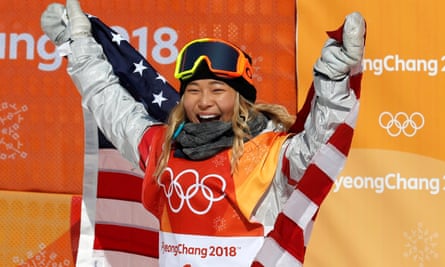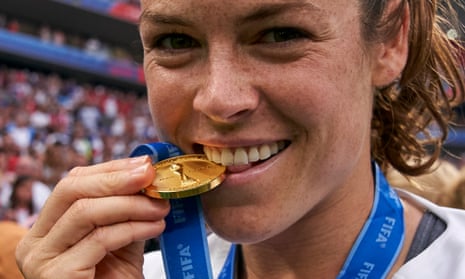After the USA won the Women’s World Cup in France last year, Kelley O’Hara wrote on Instagram, “Maybe one day I’ll be able to put this journey into words”. One rollercoaster year on and she still can’t. “I don’t know if I ever will be able to because there was just so much emotion and it’s difficult to express through words,” she says with a laugh.
The 31-year-old defender has just finished playing in the NWSL Challenge Cup, hosted by her club, Utah Royals. “It wasn’t the ideal ending,” she says of their one win, one draw and three defeats in the first return of professional sport in the US.
A quarter-final defeat on penalties to the eventual winners, Houston Dash, on 17 July ended Utah’s participation and although there were hiccups, O’Hara was full of praise for the league for staging the competition. The final was watched by a record 653,000 viewers on CBS, a 293% increase on the 2019 final, and made it the most-watched match in NWSL history.
On the day O’Hara laced up for the quarter-final she also announced she would be hosting a weekly podcast for Just Women’s Sport, a media platform founded by the former player Haley Rosen and created and owned by female athletes.
When the podcast launched with an interview involving O’Hara’s USA teammate Alex Morgan it raced to the top of the sports podcast chart in the US. Listening to O’Hara’s relaxed conversation with her 2011 World Cup roommate almost feels as if you are intruding, as they discuss everything from post-World Cup partying to how Morgan is finding motherhood after the birth of her daughter Charlie in May.
That is the point of O’Hara’s involvement in a project that is looking to impact on the fact that in the US only 4% of sports coverage is dedicated to women’s sport. With the voices of the USA women’s team more powerful than ever after their heroics in France, their very public fight for equal pay and their support for the Black Lives Matter movement, it is important to O’Hara to have a place where athletes can put out their opinions in the manner they want them to be heard.
“It’s not that they gave an interview and then somebody wrote [it up]; you’re hearing them speak on topics that matter to them, that are important to them,” she says. “And I think that is the best way to be able to express yourself.”
She is not only speaking with footballers. The second podcast was with the snowboarder Chloe Kim, a five-times X Games champion and gold medallist in the halfpipe at the 2018 Winter Olympics.

“Talking to the media is sometimes very scripted,” O’Hara says. “It’s just a different conversation than if two pals are sitting down having a chat athlete to athlete, even when I’ve interviewed athletes in all different sports. I [often] don’t understand their sport specifically. But I understand the mentality of an athlete, I understand the obstacles, the highs, the lows, that sort of thing. So there’s this connection that is there. The peer-to-peer athlete talk creates a trusting environment and people can be more vulnerable.”
O’Hara also sees it as a way to lift lesser-covered women’s sports and athletes.
“Every time we win our World Cup and Olympics, it just elevates the [football] team that much more,” she says. “Our success on the field is culturally ingrained in us and I do think that our activism and advocacy off the field has also been part of this team for just as long a time. We’re just building on the last generation and trying to continue to fight for what we believe in.”
In recent weeks women’s sport in the US has been riding the crest of a wave, with the NWSL Challenge Cup a big success, the return of the WNBA similarly followed, and the announcement of two new NWSL teams, Racing Louisville and Angel City.

“It’s awesome,” O’Hara says. “I’m so excited for the future. I don’t know if I’d say jealous [of younger players] because I feel like I’ve had a very good football career professionally. So I won’t ever take that away from myself or wish that it was different. I’m more so excited for them.
“And the closer we can get it to where it needs to be, the better. And then it’ll just be me as a fan, you know, in my old age, going to these games that are sold out in big stadiums and enjoying them and being happy for having been part of the process.”
Rosen adds: “It is so exciting, inspiring and motivating. All of this is a bet on women. For a long time, we’ve been uncomfortable betting on women but that’s changing. The’99ers [the USA team who won the 1999 World Cup] are now on the other side in a new position to push this race forward and they’re doing it.
“We’re just seeing a generation of women that grew up playing sports now reinvesting in the space and I think it’s just going to get bigger and bigger and grow and grow and we’re going to see more people getting involved.“
